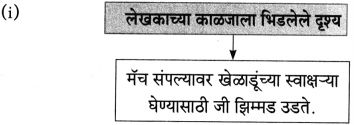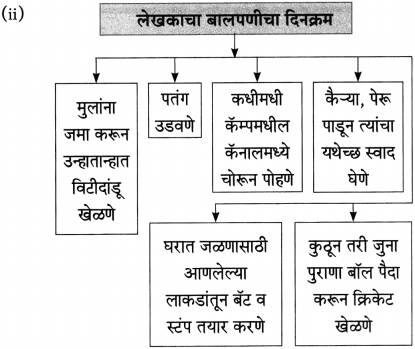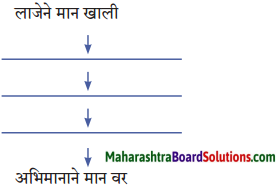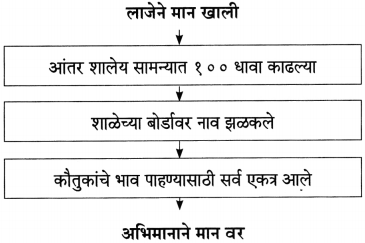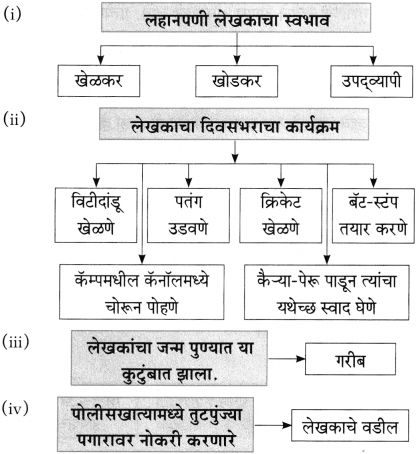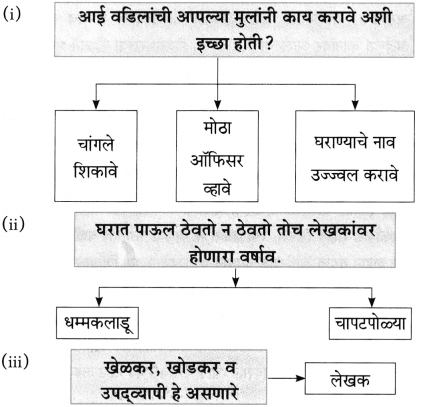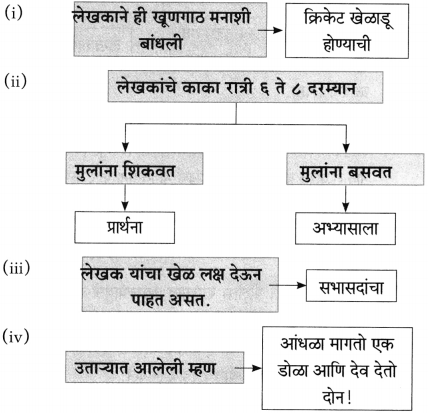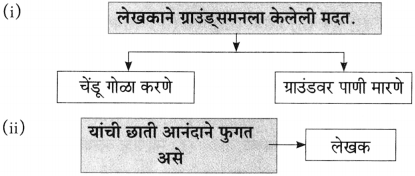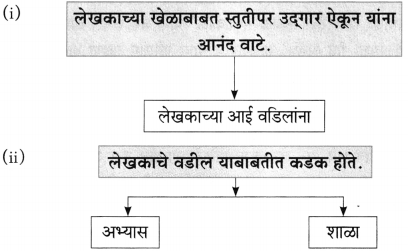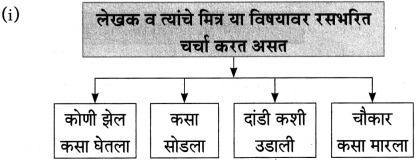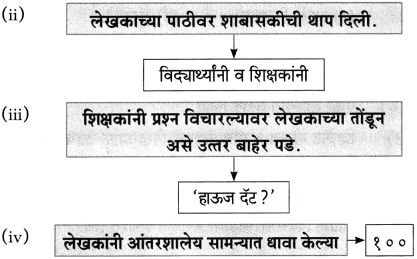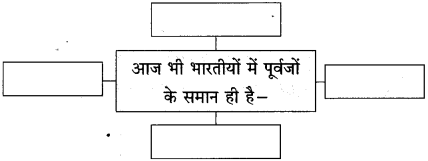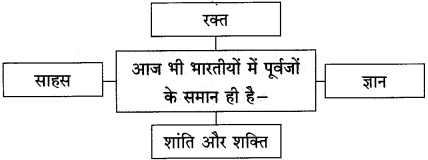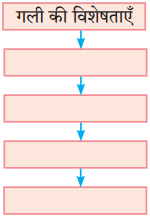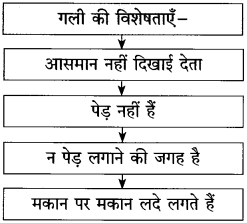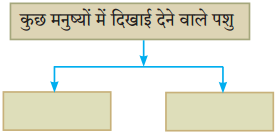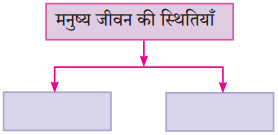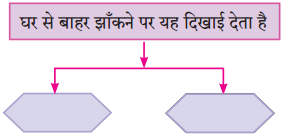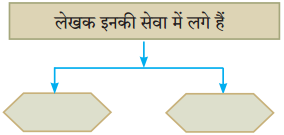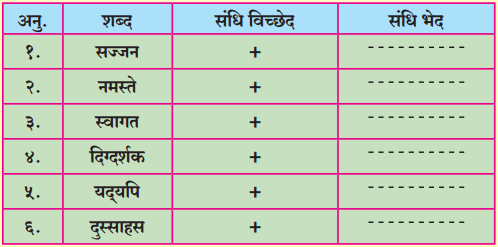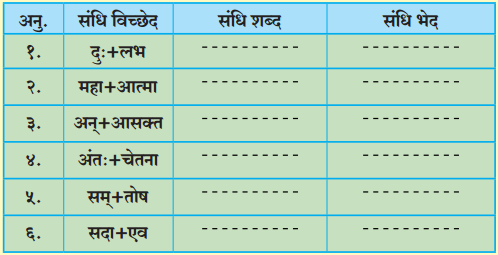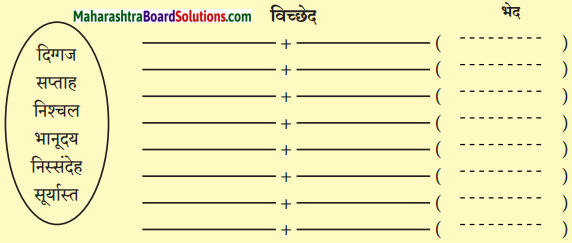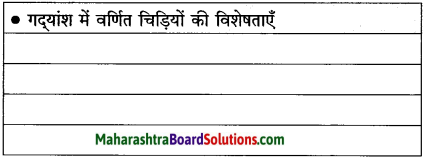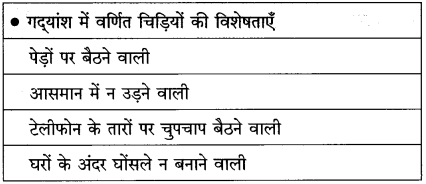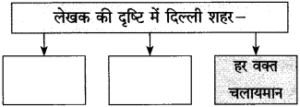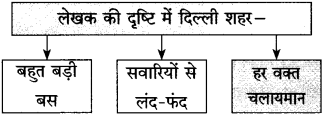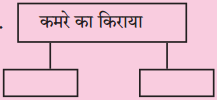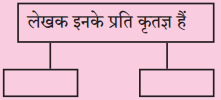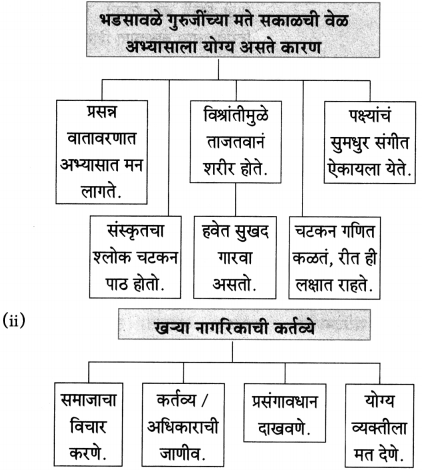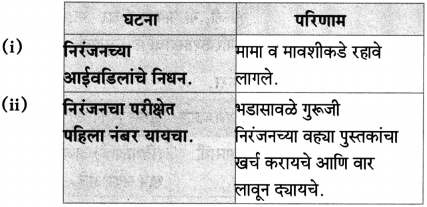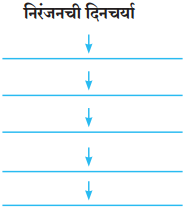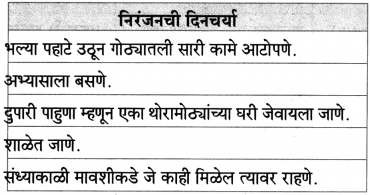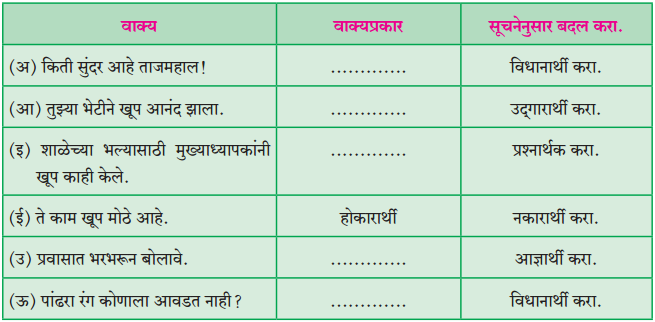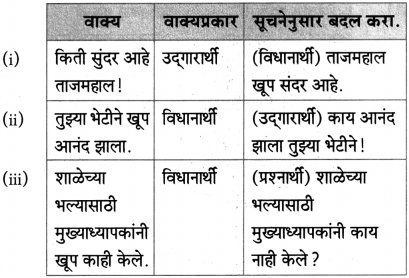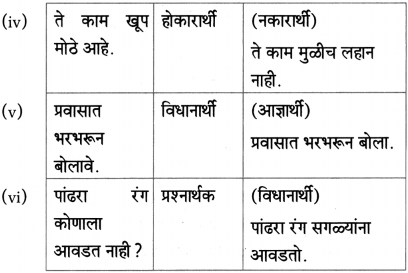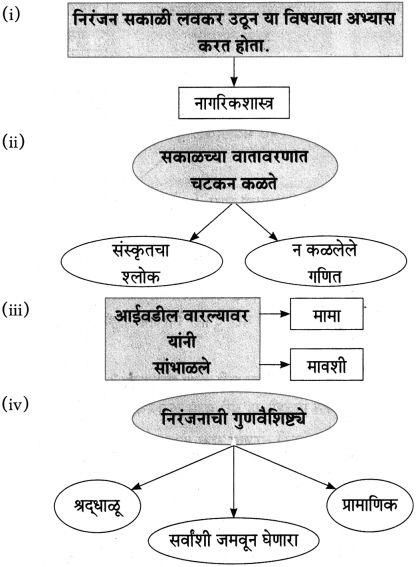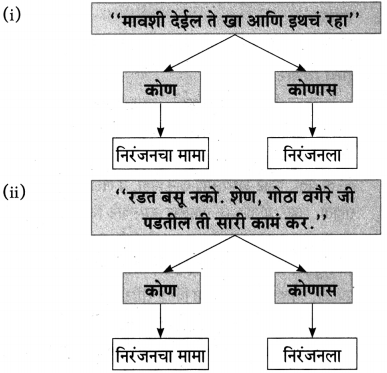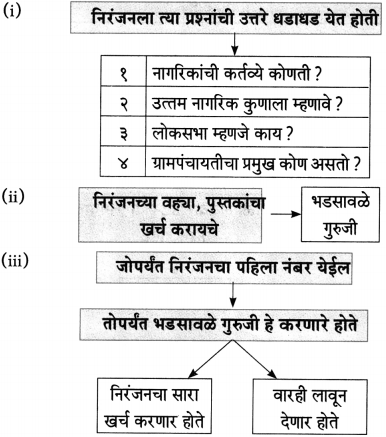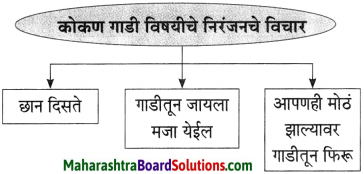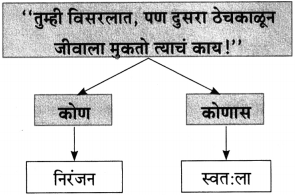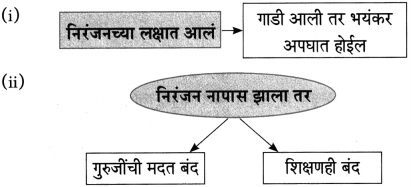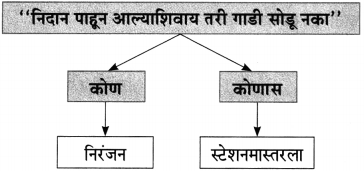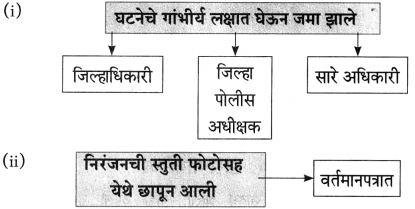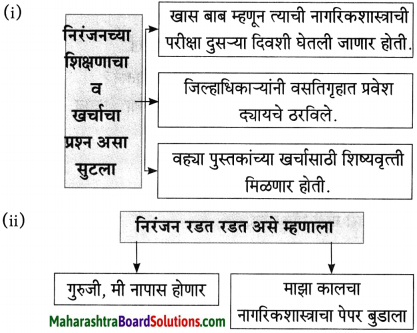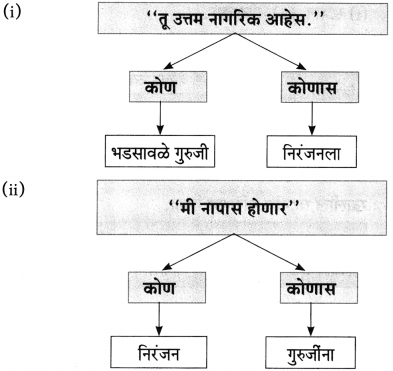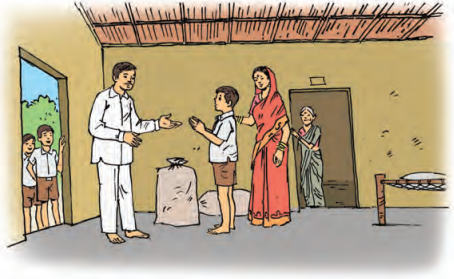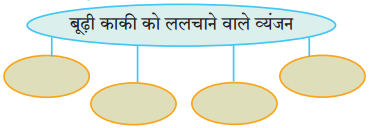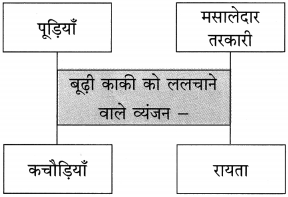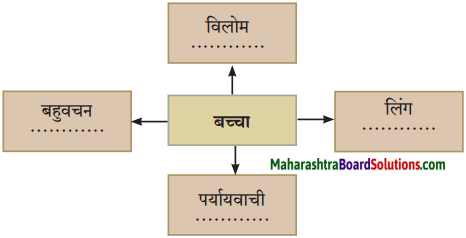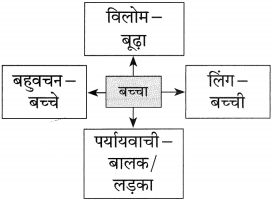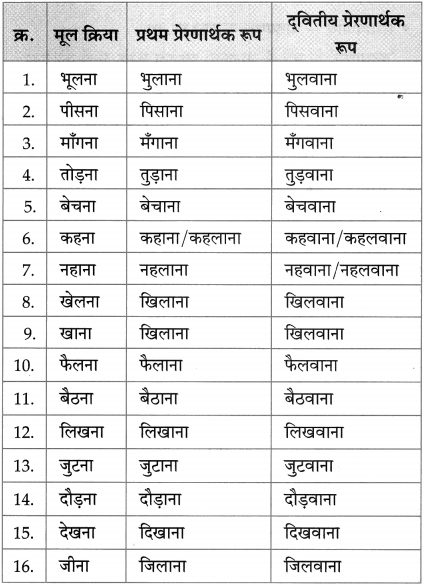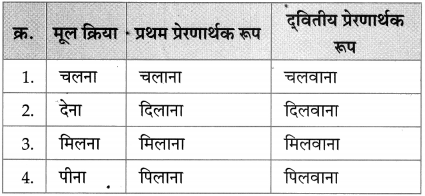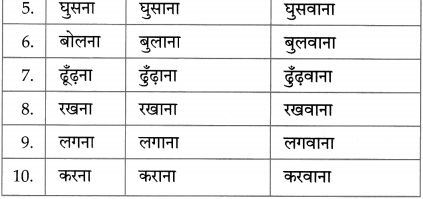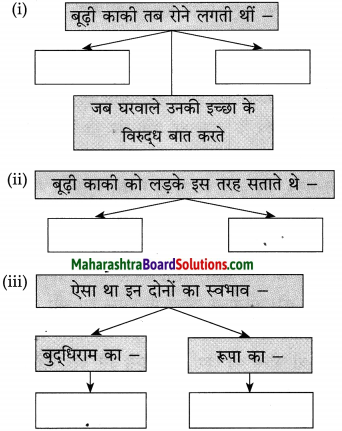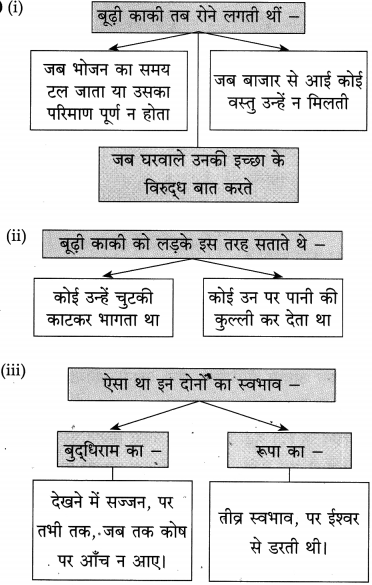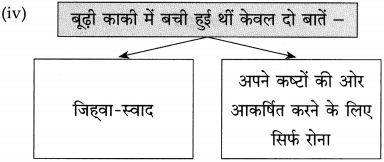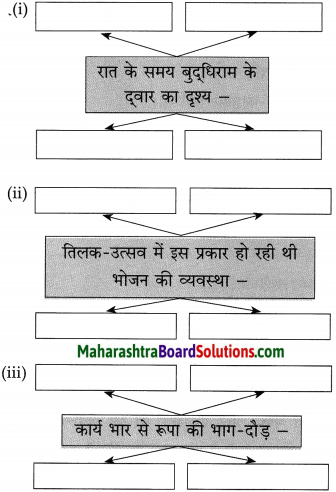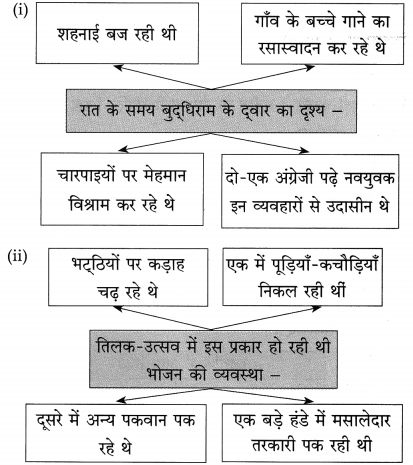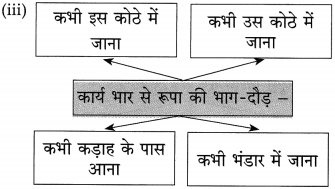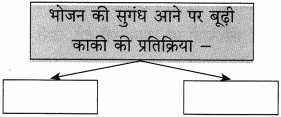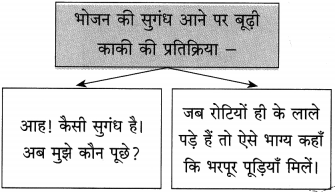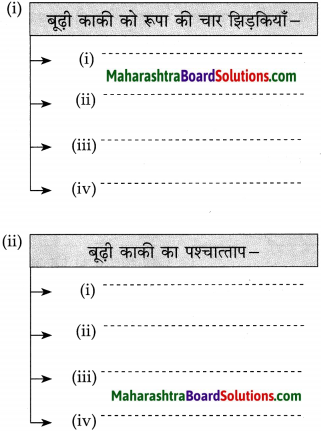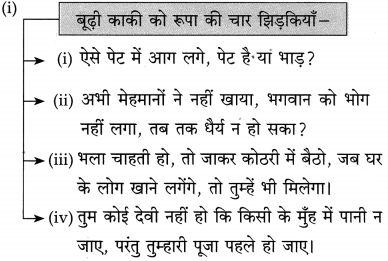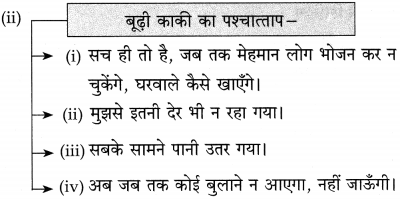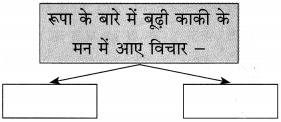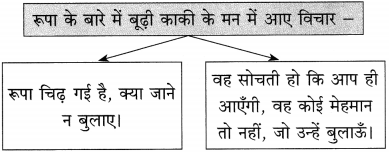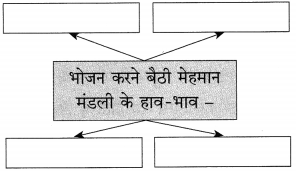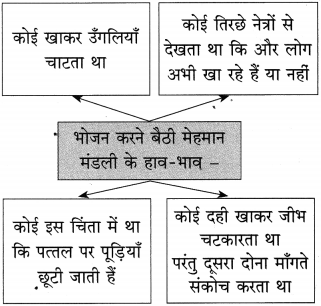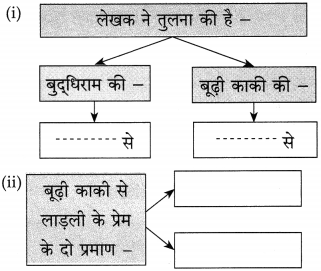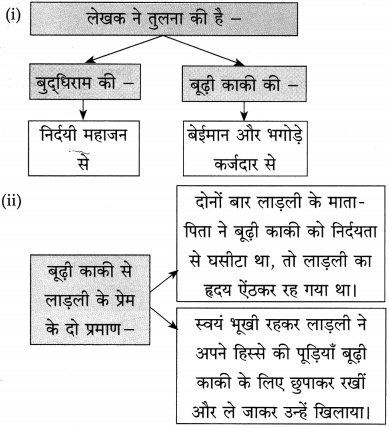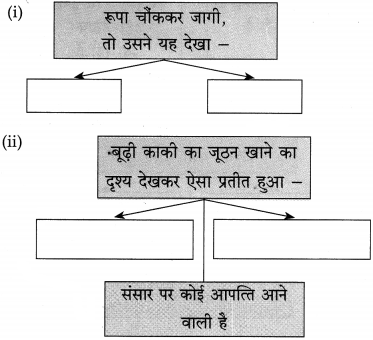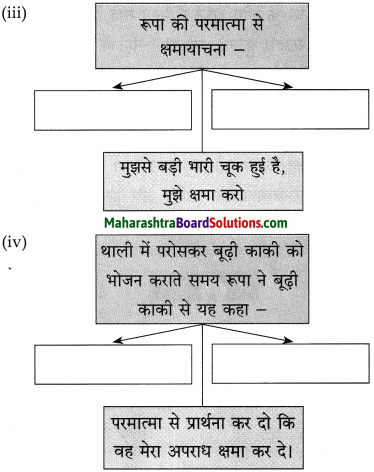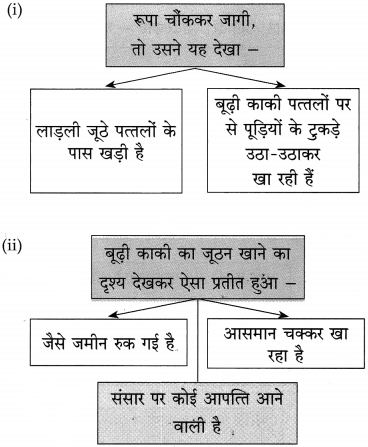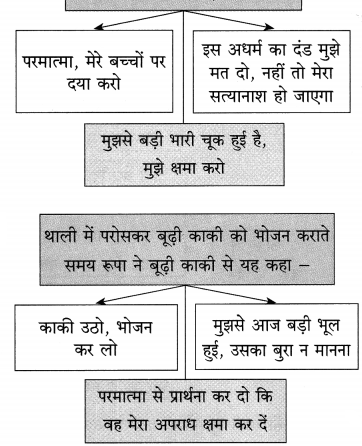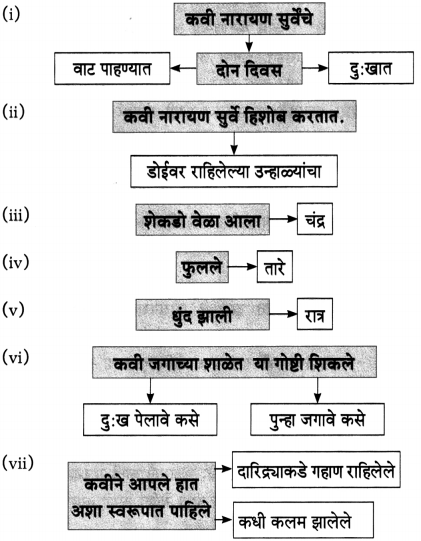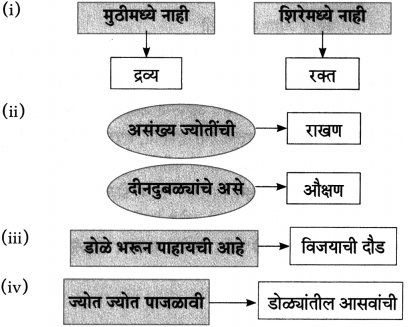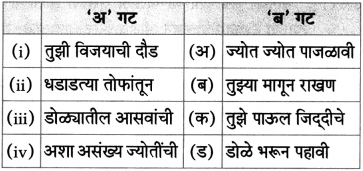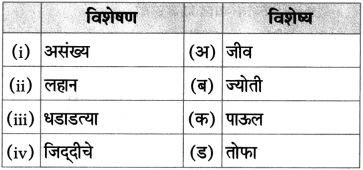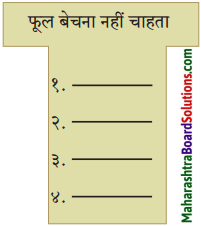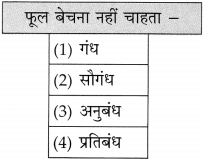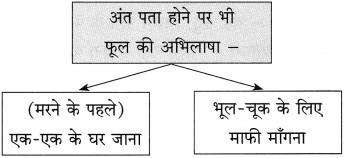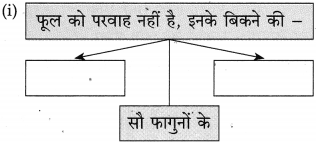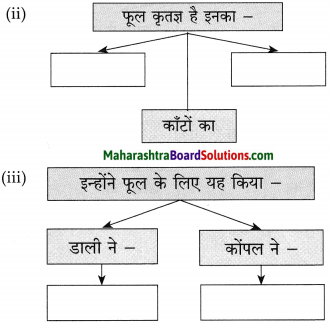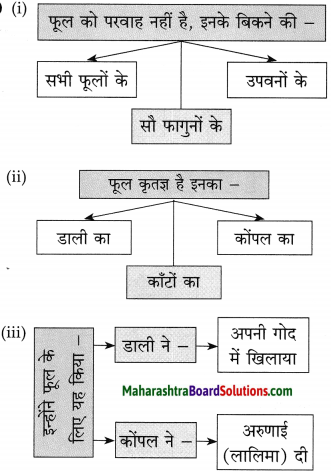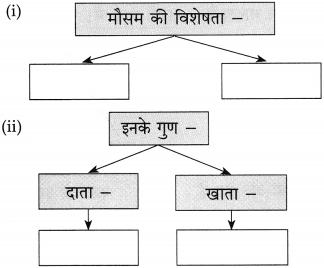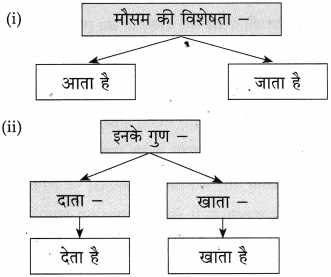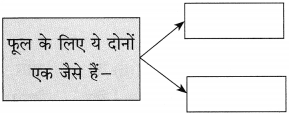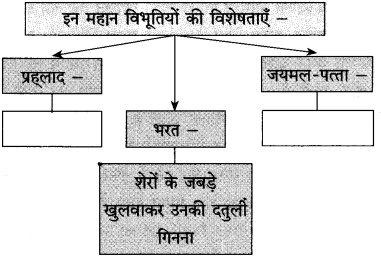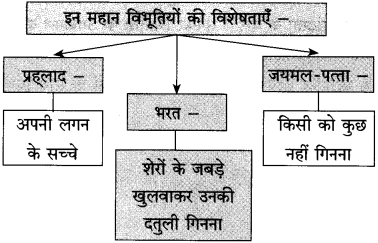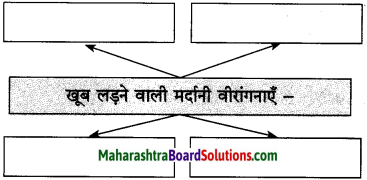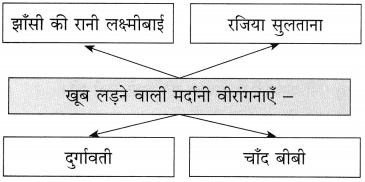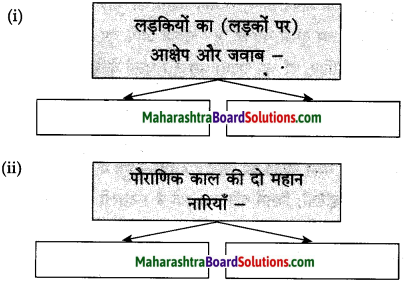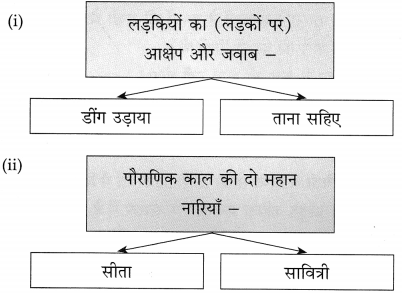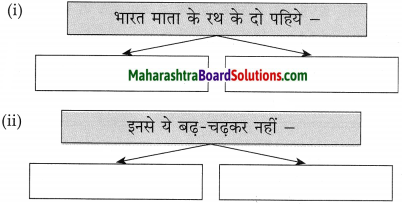Std 10 Hindi Chapter 6 Giridhar Nagar Question Answer Maharashtra Board
Balbharti Maharashtra State Board Class 10 Hindi Solutions Lokbharti Chapter 6 गिरिधर नागर Notes, Textbook Exercise Important Questions and Answers.
Hindi Lokbharti 10th Digest Chapter 6 गिरिधर नागर Questions And Answers
Hindi Lokbharti 10th Std Digest Chapter 6 गिरिधर नागर Textbook Questions and Answers
कृति
(कृतिपत्रिका के प्रश्न 2 (अ) तथा प्रश्न 2 (आ) के लिए)
सूचनानुसार कृतियाँ कीजिए:
प्रश्न 1.
संजाल पूर्ण कीजिए:
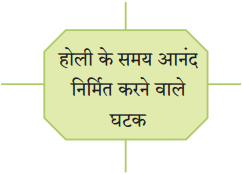
उत्तर:
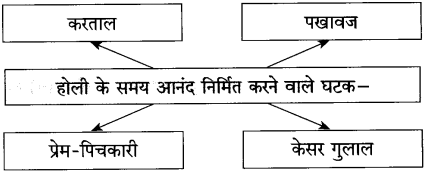
प्रश्न 2.
प्रवाह तालिका पूर्ण कीजिए:
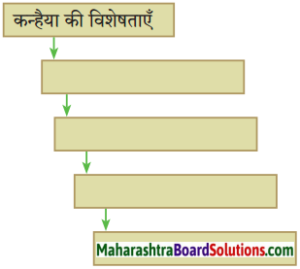
उत्तर:
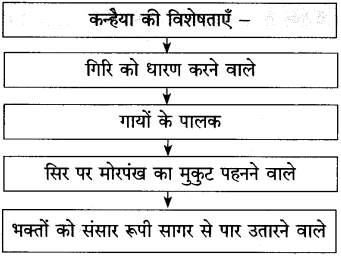
![]()
प्रश्न 3.
इस अर्थ में आए शब्द लिखिए:
| अर्थ | शब्द | |
| i. | दासी | …………. |
| ii. | साजन | …………. |
| iii. | बार-बार | …………. |
| iv. | आकाश | …………. |
उत्तर:
| अर्थ | शब्द | |
| i. | दासी | चेरी |
| ii. | साजन | पति |
| iii. | बार-बार | बेर-बेर |
| iv. | आकाश | अंबर |
प्रश्न 4.
कन्हैया के नाम

उत्तर:

प्रश्न 5.
दूसरे पद का सरल अर्थ लिखिए।
उत्तर:
(i) निकट – ढिग
(ii) साजन – पति।
उपयोजित लेखन
निम्नलिखित शब्दों के आधार पर कहानी लेखन कीजिए तथा उचित शीर्षक दीजिए:
अलमारी, गिलहरी, चावल के पापड़, छोटा बच्चा
उत्तर:
जीव दया
एक गाँव में एक छोटा बच्चा रहता था। उसका नाम चिंटू था। एक दिन चिंटू अपने घर के बाहर खेल रहा था। उसने देखा कि सामने एक पेड़ के नीचे दो-तीन कौए किसी चीज पर चोंच मार रहे हैं और वहाँ से हल्की-हल्की चर्ची-चीं की आवाज आ रही है। चिंटू दौड़कर वहाँ पहुँचा और उसने उन कौओं को वहाँ से उड़ाया। उसने देखा कि एक छोटी-सी गिलहरी वहाँ ची-चीं कर रही थी। उसका शरीर कौओं की चोंच से घायल हो गया था। चिंटू ने अपनी जेब से रूमाल निकाला और डरे बिना धीरे से गिलहरी को उठा लिया। उसने घर के अंदर लाकर उसे पानी पिलाया, उसके घावों को साफ करके उन पर सोफामाइसिन लगाई और उसे मेज पर बैठा दिया।
गिलहरी कुछ देर बाद धीरे-धीरे मेज पर घूमने लगी। मेज पर एक प्लेट में चावल के पापड़ रखे थे। गिलहरी ने एक पापड़ उठाया और अपने अगले दोनों पंजों में पकड़कर धीरे-धीरे उसे खाने लगी। चिंटू को बहुत अच्छा लगा। उसने माँ से पूछा कि जब तक गिलहरी बिलकुल ठीक नहीं हो जाती क्या मैं उसे अपने पास रख सकता हूँ। अभी अगर वह बाहर जाएगी तो कौए उसे अपना आहार बना लेंगे। माँ को चिंटू की ऐसी सोच पर गर्व हुआ और उन्होंने खुशी-खुशी उसकी बात मान ली। चिंटू ने अपनी किताबों की खुली आलमारी के एक खाने में एक तौलिया बिछाकर गिलहरी को बैठा दिया। उसके पास चावल के कुछ पापड़ तथा अमरूद के कुछ टुकड़े रख दिए। तीन-चार दिन बाद जब गिलहरी अच्छी तरह दौड़ने लगी तो चिंटू ने उसे बाहर पेड़ पर छोड़ दिया।
सीख: हमें पशु-पक्षियों के प्रति दया भाव रखना चाहिए।
![]()
अपठित पद्यांश
सूचना के अनुसार कृतियाँ कीजिए:-
काम जरा लेकर देखो, सख्त बात से नहीं स्नेह से
अपने अंतर का नेह अरे, तुम उसे जरा देकर देखो।
कितने भी गहरे रहें गर्त, हर जगह प्यार जा सकता है,
कितना भी भ्रष्ट जमाना हो, हर समय प्यार भा सकता है।
जो गिरे हुए को उठा सके, इससे प्यारा कुछ जतन नहीं,
दे प्यार उठा पाए न जिसे, इतना गहरा कुछ पतन नहीं ।।
– (भवानी प्रसाद मिश्र)
प्रश्न 1.
उत्तर लिखिए:
a. किसी से काम करवाने के लिए उपयुक्त – ………….
b. हर समय अच्छी लगने वाली बात – ………….
उत्तर:
प्रश्न 2.
उत्तर लिखिए:
a. अच्छा प्रयत्न यही है – ………….
b. यही अधोगति है – ………….
उत्तर:
प्रश्न 3.
पद्यांश की तीसरी और चौथी पंक्ति का संदेश लिखिए।
उत्तर:
भाषा बिंदु
कोष्ठक में दिए गए प्रत्येक/कारक चिह्न से अलग-अलग वाक्य बनाइए और उनके कारक लिखिए:
[ने, को, से, का, की, के, में, पर, हे, अरे, के लिए]
………………………………………………………..
………………………………………………………..
………………………………………………………..
………………………………………………………..
………………………………………………………..
उत्तर:
(1) ने – ऋतु ने खाना बनाया।
(2) को – विपिन ने प्रगति को खाना खिलाया।
(3) से – हिमानी साइकिल से ऑफिस जाती है।
(4) का – शुभम हर्षित का भाई है।
(5) की – पूर्वी आयुष की बहन है।
(6) के – नीरज के तीन चाचा हैं।
(7) में – नीनू घर में है।
(8) पर – पेड़ पर बंदर कूद रहे हैं।
(9) हे – हे भगवान, कितना शोर है यहाँ।
(10) अरे – अरे! सलिल तुम कहाँ हो?
(11) के लिए – अंशु वारिजा के लिए फ्रॉक लाई।
Hindi Lokbharti 10th Textbook Solutions Chapter 6 गिरिधर नागर Additional Important Questions and Answers
![]()
पद्यांश क्र. 1
प्रश्न.
निम्नलिखित पठित पद्यांश पढ़कर दी गई सूचनाओं के अनुसार कृतियाँ कीजिए:
कृति 1: (आकलन)
प्रश्न 1.
आकृति पूर्ण कीजिए:
(i)

उत्तर:

(ii) a. श्रीकृष्ण के सिर पर है
b. मीरा इन्हें अपना पति मानती हैं –
उत्तर:
a. श्रीकृष्ण के सिर पर है – मोर मुकट
b. मीरा इन्हें अपना पति मानती हैं – गिरधर गोपाल
प्रश्न 2.
संजाल पूर्ण कीजिए:
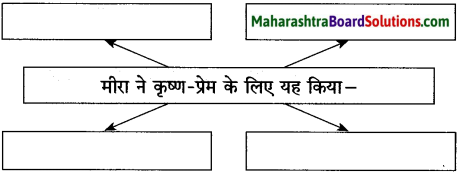
उत्तर:
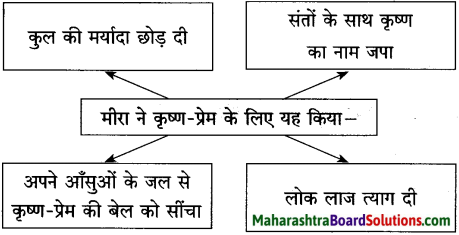
![]()
प्रश्न 3.
उचित जोड़ियाँ मिलाइए:
| अ | आ |
| आँसुओं के जल से कुल की मर्यादा प्रेम बेल संत संगति के कारण | छोड़ दी आनंद फल लोक लाज खोई प्रेम की बेल सींची प्रेम से बिलोई। |
उत्तर:
| अ | आ |
| आँसुओं के जल से कुल की मर्यादा प्रेम बेल संत संगति के कारण | प्रेम की बेल सींचा। छोड़ दी। आनंद फल। लोक लाज खोई। |
कृति 2: (शब्द संपदा)
प्रश्न 1.
निम्नलिखित शब्दों को शुद्ध रूप में लिखिए:
(i) भगत – …………………….
(ii) माखन – …………………….
(iii) आणंद – …………………….
(iv) जाके – …………………….
उत्तर:
(i) भगत – भक्त
(ii) माखन – मक्खन
(iii) आणंद – आनंद
(iv) जाके – जिसके।
प्रश्न 2.
निम्नालाखत शब्दा क समानाथा शब्दालाखए:
(i) मोर = …………………….
(ii) जगत = …………………….
(iii) दूध = …………………….
(iv) प्रेम = …………………….
उत्तर:
(i) मोर = मयूर
(ii) जगत = संसार
(iii) दूध = दुग्ध
(iv) प्रेम = प्यार।
प्रश्न 3.
निम्नलिखित अर्थवाले शब्द पद्यांश से चुनकर लिखिए:
(i) उद्घार करो – …………………….
(ii) मुझे – …………………….
उत्तर:
(i) उद्घार करो – तारो
(ii) मुझे – मोही।
![]()
कृति 3: (सरल अर्थ)
प्रश्न.
उपर्युक्त पद्यांश की अंतिम चार पंक्तियों का सरल अर्थ 25 से 30 शब्दों में लिखिए।
उत्तर:
मैंने दूध जमाने के पात्र में जमे दही को मथानी से बड़े प्रेम से बिलोया और उसमें से कृष्ण-प्रेम रूपी मक्खन को निकाल लिया। शेष छाछ रूपी निस्सार जगत को छोड़ दिया। कृष्ण-भक्तों को देखकर मैं प्रसन्न होती हूँ, परंतु संसार का व्यवहार देख मुझे दुख होता है और मैं रो पड़ती हूँ। हे गिरधरलाल, मीरा तो आपकी दासी है, उसे इस संसार रूप भव-सागर से पार लगाओ।
पद्यांश क्र. 2
प्रश्न.
निम्नलिखित पठित पद्यांश पढ़कर दी गई सूचनाओं के अनुसार कृतियाँ कीजिए:
कृति 1: (आकलन)
प्रश्न 1.
आकृति पूर्ण कीजिए:
(i) ये मीरा के प्रतिपालक हैं
(ii) कृष्ण के बिना इनको कहीं आश्रय नहीं है –
(iii) मीरा को प्रभु से मिलने की तीव्र यह है –
(iv) मीरा की यह संसार सागर में डूबने वाली है
उत्तर:
(i) ये मीरा के प्रतिपालक हैं – कृष्ण
(ii) कृष्ण के बिना इनको कहीं आश्रय नहीं है – मीरा
(iii) मीरा को प्रभु से मिलने की तीव्र यह है – लालसा
(iv) मीरा की यह संसार सागर में डूबने वाली है – नौका
प्रश्न 2.
पद्यांश में आए इस अर्थ के शब्द लिखिए:
(i) दासी
(ii) आश्रय
(iii) बार-बार
(iv) नौका।
उत्तर:
(i) दासी – चेरी
(ii) आश्रय – गती
(iii) बार-बार – बेर-बेर
(iv) नौका – बेरी।
प्रश्न 3.
विधानों के सामने सत्य / असत्य लिखिए:
(i) हरि बिना मीरा को कहीं आश्रय नहीं है।
(ii) कृष्ण मीरा के पति हैं और वे उनकी पत्नी।
(iii) मीरा बार-बार प्रभु की आरती करती हैं।
(iv) मीरा की जीवन नौका संसार सागर में डूबने वाली है।
उत्तर:
(i) सत्य
(i) असत्य
(iii) असत्य
(iv) सत्य।
प्रश्न 4.
आकृति पूर्ण कीजिए:

उत्तर:
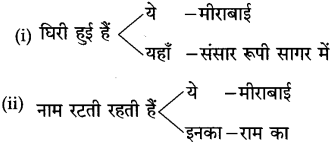
![]()
कृति 2: (शब्द संपदा)
प्रश्न 1.
निम्नलिखित शब्दों के अर्थ लिखिए:
(i) कूण – …………………..
(ii) रावरी – …………………..
(iii) बेरी – …………………..
(iv) नेरी – …………………..
उत्तर:
(i) कूण – कहाँ
(ii) रावरी – आपकी
(iii) बेरी – बेड़ा
(iv) नेरी – पास, निकट।
प्रश्न 2.
निम्नलिखित शब्दों के लिंग पहचान कर लिखिए:
(i) पखावज …………………..
(ii) पिचकारी …………………..
(iii) गुलाल …………………..
(iv) चरण …………………..
उत्तर:
(i) पखावज – स्त्रीलिंग
(ii) पिचकारी – स्त्रीलिंग
(iii) गुलाल – पुल्लिंग
(iv) चरण – पुल्लिंग।
कृति 3: (सरल अर्थ)
प्रश्न.
उपयुक्त पद्यांश की ‘हरि बिन कूण आरति है तेरी।।’ पंक्तियों का सरल अर्थ 25 से 30 शब्दों में लिखिए।
उत्तर:
हे हरि, आपके बिना मेरा कौन है? अर्थात आपके सिवा मेरा कोई ठिकाना नहीं है। आप ही मेरा पालन करने वाले हैं और मैं आपकी दासी हूँ। मैं रात-दिन, हर समय आपका ही नाम जपती रहती हूँ। में बार-बार आपको पुकारती हूँ, क्योंकि मुझे आपके दर्शनों की तीव्र लालसा है।
पद्यांश क्र. 3
कृति 1: (आकलन)
प्रश्न 1.
पद्यांश में आए इस अर्थ के शब्द लिखिए:
बोर्ड की नमूना कृतिपत्रिका
(i) कमल
(ii) आकाश
(iii) श्रेष्ठ
(iv) संतोष।
उत्तर:
(i) कमल – कँवल
(ii) आकाश – अंबर
(iii) श्रेष्ठ – छतीयूँ
(iv) संतोष – संतोख।
![]()
प्रश्न 2.
जोड़ियाँ बनाइए:

उत्तर:
(i) सुर – राग
(ii) करताल – झनकार
(iii) घट – पट
(iv) प्रेम – पिचकार।
प्रश्न 3.
आकृति पूर्ण कीजिए:
(i) आकाश लाल हो गया है इससे –
(ii) गिरिधर नागर हैं मीरा के ये –
उत्तर:
(i) आकाश लाल हो गया है इससे – गुलाल से।
(ii) गिरिधर नागर हैं मीरा के ये – प्रभु।
प्रश्न 4.
उत्तर लिखिए: (बोर्ड की नमूना कृतिपत्रिका)
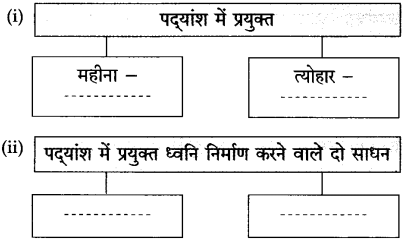
उत्तर:


कृति 2: (शब्द संपदा) (बोर्ड की नमूना कृतिपत्रिका)
पद्यांश से ढूँढ़कर लिखिए:
ऐसे दो शब्द जिनका वचन परिवर्तन से रूप नहीं बदलता –
(i) ……………………..
(ii) ……………………..
उत्तर:
(i) दिन
(ii) चरण।
![]()
कृति 3: (सरल अर्थ)
प्रश्न.
उपर्युक्त पद्यांश की प्रथम चार पंक्तियों का सरल अर्थ 25 से 30 शब्दों में लिखिए। (बोर्ड की नमूना कृतिपत्रिका)
उत्तर:
हे मेरे मन, फागुन मास में होली खेलने का समय अति अल्प होता है। अतः तू जी भरकर होली खेल। अर्थात मानव जीनव अस्थायी है, इसलिए भगवान कृष्ण से पूर्ण रूप से प्रेम कर ले। जिस प्रकार होली के उत्सव में नाच आदि का आयोजन होता है, उसी प्रकार कृष्ण-प्रेम में मुझे ऐसा प्रतीत होता है मानो करताल, पखावज आदि बाजे बज रहे हैं और अनहद नाद का स्वर सुनाई दे रहा है, जिससे मेरा हृदय बिना स्वर और राग के अनेक रागों का आलाप करता रहता है। मेरा रोम-रोम भगवान कृष्ण के प्रेम के रंग में डूबा रहता है। मैंने अपने प्रिय से होली खेलने के लिए शील और संतोष रूपी केसर का रंग घोला है। मेरा प्रिय-प्रेम ही होली खेलने की पिचकारी है।
भाषा अध्ययन (व्याकरण)
प्रश्न.
सूचनाओं के अनुसार कृतियाँ कीजिए:
1. शब्द भेद:
अधोरेखांकित शब्दों का शब्दभेद पहचानकर लिखिए:
(i) बाहर कोई नहीं है।
(ii) माँ को हंसी आ गई।
(iii) चतुर वैद्य विष से भी दवा का काम ले सकता है।
उत्तर:
(i) कोई – अनिश्चयवाचक सर्वनाम।
(ii) हँसी – भाववाचक संज्ञा।
(iii) चतुर – गुणवाचक विशेषण।
2. अव्यय:
निम्नलिखित अव्ययों का अपने वाक्यों में प्रयोग कीजिए:
(i) भी
(ii) इसलिए।
उत्तर:
(i) भी – हमारी बेटी गाय से भी अधिक सीधी है।
(ii) इसलिए – नीरज बीमार था, इसलिए दफ्तर नहीं गया।
3. संधि:
कृति पूर्ण कीजिए:
संधि शब्द – संधि विच्छेद – संधि भेद
…………. – उत् + लेख। – ……………
अथवा
तपोबल – …………… – ……………
उत्तर:
संधि शब्द – संधि विच्छेद – संधि भेद
उल्लेख – उत् + लेख – व्यंजन संधि
अथवा
तपोबल – तपः + बल – विसर्ग संधि
4. सहायक क्रिया:
निम्नलिखित वाक्यों में से सहायक क्रियाएँ पहचानकर उनका मूल रूप लिखिए:
(i) यह कुरसी दीवार की तरफ खिसका दो।
(ii) हम समय पर स्टेशन पहुंच गए।
उत्तर:
सहायक क्रिया – मूल रूप
(i) दो – देना
(ii) गए – जाना
![]()
5. प्रेरणार्थक क्रिया:
निम्नलिखित क्रियाओं के प्रथम प्रेरणार्थक और द्वितीय प्रेरणार्थक रूप लिखिए:
(i) पढ़ना
(ii) जीतना
(ii) करना।
उत्तर:
क्रिया – प्रथम प्रेरणार्थक रूप – द्वितीय प्रेरणार्थक रूप
(i) पढ़ना – पढ़ाना – पढ़वाना
(ii) जीतना – जिताना – जितवाना
(iii) करना – कराना – करवाना
6. मुहावरे:
(1) निम्नलिखित मुहावरों का अर्थ लिखकर वाक्य में प्रयोग कीजिए:
(i) चैन न मिल पाना
(ii) झेंप जाना।
उत्तर:
(i) चैन न मिल पाना।
अर्थ: बेचैनी अनुभव करना। वाक्य: मालिक की कड़ी बातें सुनकर मुनीम को चैन न मिल पाया।
(ii) झेंप जाना।
अर्थ: लज्जित होना, शरमाना। वाक्य: नकल करने पर मित्र की फटकार सुनकर अभिनव झेंप गया।
(2) अधोरेखांकित वाक्यांशों के लिए कोष्ठक में दिए गए उचित मुहावरे का चयन करके वाक्य फिर से लिखिए:
(नाक-भौं सिकोड़ना, गुदगुदा देना, सिर झुका देना)
(i) अप्रिय बात सुनकर सभी तिरस्कार प्रकट करेंगे।
(ii) जीवन में आनंददायी क्षण बहुत कम होते हैं।
उत्तर:
(i) अप्रिय बात सुनकर सभी नाक-भौं सिकोड़ेंगे।
(ii) जीवन में गुदगुदाने वाले क्षण बहुत कम होते हैं।
7. विरामचिह्न:
निम्नलिखित वाक्यों में यथास्थान उचित विरामचिह्नों का प्रयोग करके वाक्य फिर से लिखिए:
(i) मैं कहाँ से पैसे , पहले तो दूध की बिक्री के पैसे मेरे पास जमा रहते थे
(ii) सहसा कानों में आवाज आई काकी उठो मैं पूड़ियाँ लाई हूँ
उत्तर:
(i) “मैं कहाँ से पैसे दूँ? पहले तो दूध की बिक्री के पैसे मेरे पास जमा रहते थे।”
(ii) सहसा कानों में आवाज आई – “काकी, उठो मैं पूड़ियाँ लाई हूँ।”
8. काल परिवर्तन:
निम्नलिखित वाक्यों का सूचना के अनुसार काल परिवर्तन कीजिए:
(i) विदा का क्षण आ गया। (सामान्य भविष्यकाल)
(ii) आप छत पर क्या करते हैं? (अपूर्ण भूतकाल)
(iii) मेरी गाड़ी तो बिक जाती है। (पूर्ण वर्तमानकाल)
उत्तर:
(i) विदा का क्षण आ जाएगा।
(ii) आप छत पर क्या कर रहे थे?
(iii) मेरी गाड़ी तो बिक गई है।
9. वाक्य भेद:
(1) निम्नलिखित वाक्यों का रचना के आधार पर भेद पहचान कर लिखिए:
(i) संसार का व्यवहार देखकर मुझे दुःख होता है और मैं रो पड़ती हूँ।
(ii) मीराबाई कहती हैं कि अब उन्हें लोकलाज का कोई डर नहीं हैं।
उत्तर:
(i) संयुक्त वाक्य
(ii) मिश्र वाक्य।
![]()
(2) निम्नलिखित वाक्यों का अर्थ के आधार पर दी गई सूचना के अनुसार परिवर्तन कीजिए:
(i) संतो के साथ बैठकर मैंने लोकलाज त्याग दी है। (विस्मयादिबोधक वाक्य)
(ii) हे हरि, आप ही मेरा पालन करने वाले हैं। (आज्ञावाचक वाक्य)
उत्तर:
(i) हाय! संतों के साथ बैठकर मैंने लोकलाज त्याग दी है।
(ii) हे हरि, आप ही मेरा पालन करें।।
11. वाक्य शुद्धिकरण:
निम्नलिखित वाक्य शुद्ध करके लिखिए:
(i) लेखक ने अभिनेता की घमंड तोड़ी।
(ii) हमने क्रिकेट की मैच देखी।
उत्तर:
(i) लेखक ने अभिनेता का घमंड तोड़ा।
(ii) हमने क्रिकेट का मैच देखा।
गिरिधर नागर Summary in Hindi
गिरिधर नागर कविता का सरल अर्थ
1. मेरे तो गिरधर गोपाल …………………………….. तारो अब मोही।।
गिरि को धारण करने वाले, गायों के पालक कृष्ण के सिवा मेरा और कोई नहीं है। जिनके मस्तक पर मोर का मुकुट शोभित है, वे ही मेरे पति हैं। उनके लिए मैंने कुल की मर्यादा छोड़ दी है। चाहे कोई मुझे कुछ भी कहे। संतों के साथ बैठ-बैठकर मैंने लोकलाज त्याग दी है। मैंने अपने प्रेम रूपी बेल को अपने अश्रु रूपी जल से सींच-सींचकर बड़ा किया है। अब तो यह प्रेम-बेल फैल गई है और इसमें आनंद रूपी फल लगने लगा है। मैंने दूध जमाने के पात्र में जमे दही को मथानी से बड़े प्रेम से बिलोया और उसमें से कृष्ण-प्रेम रूपी मक्खन को निकाल लिया। शेष छाछ रूपी निस्सार जगत को छोड़ दिया। कृष्ण-भक्तों को देखकर मैं प्रसन्न होती हूँ, परंतु संसार का व्यवहार देख मुझे दुख होता है और मैं रो पड़ती हूँ। हे गिरधरलाल, मीरा तो आपकी दासी है, उसे इस संसार रूपी भव-सागर से पार लगाओ।
2. हरि बिन कूण गती मेरी …………………………….. मैं सरण हूँ तेरी।।
हे हरि, आपके बिना मेरा कौन है? अर्थात आपके सिवा मेरा कोई ठिकाना नहीं है। आप ही मेरा पालन करने वाले हैं और मैं आपकी दासी हूँ। मैं रात-दिन, हर समय आपका ही नाम जपती रहती हूँ। मैं बार-बार आपको पुकारती हूँ, क्योंकि मुझे आपके दर्शनों की तीव्र लालसा है। यह संसार विभिन्न प्रकार के दोषों और विकारों से भरा हुआ सागर है, जिसके बीच में घिर गई हैं। इस संसार रूपी सागर में मेरी नाव टूट गई है। हे प्रभु, आप शीघ्र इस नाव का पाल बाँधिए, अन्यथा यह जीवन-नौका इस संसार-सागर में डूब जाएगी। हे प्रियतम, आपकी यह विरहिणी निरंतर आपकी बाट जोहती रहती है। आपके आगमन की प्रतीक्षा करती रहती है। आपकी यह दासी मीरा सदा आपके नाम का स्मरण करती रहती है और आपकी शरण में आई है।
3. फागुन के दिन चार …………………………….. चरण कँवल बलिहार रे।।
हे मेरे मन, फागुन मास में होली खेलने का समय अति अल्प होता है। अतः तू जी भरकर होली खेल। अर्थात मानव जीनव अस्थायी है, : इसलिए भगवान कृष्ण से पूर्ण रूप से प्रेम कर ले। जिस प्रकार होली के : उत्सव में नाच आदि का आयोजन होता है, उसी प्रकार कृष्ण-प्रेम में मुझे ऐसा प्रतीत होता है मानो करताल, पखावज आदि बाजे बज रहे हैं और अनहद नाद का स्वर सुनाई दे रहा है, जिससे मेरा हृदय बिना स्वर और राग के अनेक रागों का आलाप करता रहता है। मेरा रोम-रोम भगवान कृष्ण के प्रेम के रंग में डूबा रहता है। मैंने अपने प्रिय से होली खेलने के लिए शील और संतोष रूपी केसर का रंग घोला है। मेरा प्रिय-प्रेम ही होली खेलने की पिचकारी है। उड़ते हुए गुलाल से सारा आकाश लाल हो गया है। अब मुझे लोक-लज्जा का कोई डर नहीं है, इसलिए मैंने हृदय रूपी घर के दरवाजे खोल दिए हैं। अंत में मीरा कहती हैं कि मेरे स्वामी गोवर्धन पर्वत को धारण करने वाले कृष्ण भगवान हैं। मैंने उनके चरण-कमलों में अपना सर्वस्व न्योछावर कर दिया है।
गिरिधर नागर विषय-प्रवेश :
प्रस्तुत काव्य में रसिक शिरोमणि श्रीकृष्ण की अनन्य उपासिका मीराबाई अपना प्रेम प्रकट कर रही हैं। सभी पदों में | श्रीकृष्ण के प्रति मीराबाई के प्रेम, उनकी भक्ति, उत्सुकता, प्रिय-मिलन की आशा, प्रतीक्षा आदि का मार्मिक चित्रण है।
Class 10 Hindi Lokbharti Textbook Solutions
- भारत महिमा Class 10 Hindi Solutions
- लक्ष्मी Class 10 Hindi Solutions
- वाह रे! हमदर्द Class 10 Hindi Solutions
- मन Class 10 Hindi Solutions
- गोवा : जैसा मैंने देखा Class 10 Hindi Solutions
- गिरिधर नागर Class 10 Hindi Solutions
- खुला आकाश Class 10 Hindi Solutions
- गजल Class 10 Hindi Solutions
- रीढ़ की हड्डी Class 10 Hindi Solutions
- ठेस Class 10 Hindi Solutions
- कृषक गान Class 10 Hindi Solutions

